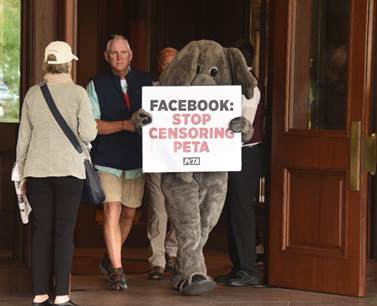
PETA ‘elephant man’ detained and given trespass warning
By Eric Valentine

There was an elephant in the room. Almost.
In an attempt to call attention to “increased warning screens” placed upon its social media content, PETA (People for the Ethical Treatment of Animals) found a creative way to talk about that proverbial elephant in the room. Activists for the group tried to enter Sun Valley Resort during the annual, secretive Allen & Company conference held there, with one man dressed in an elephant suit and holding a sign that read, “Facebook: Stop censoring PETA.”
Hoping to be seen by Facebook founder and CEO Mark Zuckerberg, the man dressed as an elephant (he called himself JJ) and his female companion attempted to enter the hotel. They said they were attempting to peacefully protest Facebook’s and Instagram’s increased use of warning screens placed over PETA videos showing cruelty to animals.
Security and staff prevented them from entering and detained them until it could be proven they were in fact guests of the hotel. Their car keys were confiscated by staff and they were issued a warning not to trespass. The standoff was tense and at one point the female companion was on her cellphone contacting lawyers, but matters ended peacefully.
“People want and deserve unfettered access to footage showing what animals endure in laboratories, slaughterhouses, roadside zoos, and elsewhere at the hands of cruel people so that they can help stop it,” said PETA Executive Vice President Tracy Reiman in a press release sent out after the incident. “This elephantine incident will only motivate PETA even more to take Facebook to task for being no friend to animals, being heavy-handed to peaceful protestors, and covering up our important videos.”
According to the animal rights organization, sharing eyewitness video footage directly with the public through social media has played a vital role in many PETA victories—including getting major companies to end experiments on animals, driving many circuses that use animals to shut down or stop using wild animals, and persuading hundreds of retailers to ban fur, angora, and mohair. Metrics, they say, show that warning screens significantly decrease the number of people who view PETA’s videos, which is why the group is calling on Facebook to implement an “opt-in” feature—like the one Twitter has—that allows users to decide for themselves whether they want warning screens to appear over graphic content.


